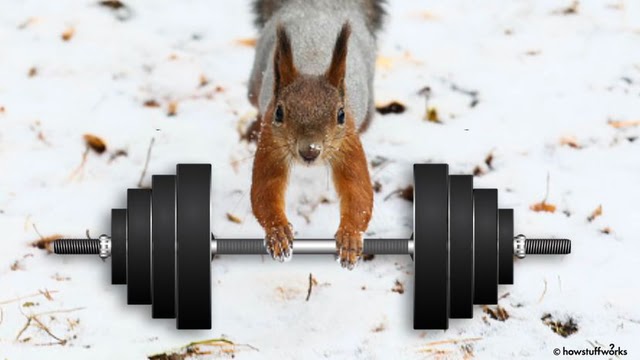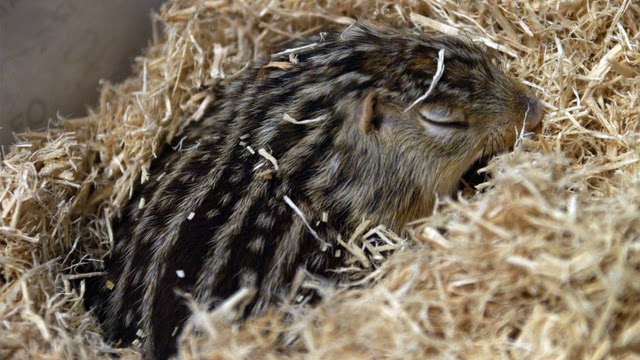Quck answer
During hibernation, squirrels experience muscle loss and reduced bone density. However, a recent study found that squirrels are able to maintain their muscle strength by using a process called “muscle jacking.” This involves the rapid contraction and relaxation of muscles, similar to weight lifting, but without the need for actual weights. The study suggests that muscle jacking may be a natural adaptation to help animals maintain their strength during periods of reduced physical activity, such as hibernation.
Wild Animals

Have you ever wondered how squirrels come out of hibernation with more muscle than they had when they went to sleep for the winter? While humans lose muscle mass when they don’t use their muscles, not all animals do. For example, the thirteen-lined ground squirrel can wake up from hibernation in the spring with the ability to hunt down prey without any training period. A recent study published in Science has revealed that the thirteen-lined ground squirrel is able to build muscle even when it’s not getting exercise or taking in nutrients thanks to its gut bacteria.
Previous studies have shown that the squirrels lose about 40 percent of their body weight during hibernation, but their leg muscles begin to build new tissue towards the end of the winter. The study in Science set out to find out how animals that have been cut off from nutrients and movement for several months manage to build muscle. Scientists discovered that the squirrels rely on specific gut bacteria to mine the urea in their bodies for nitrogen, which is essential for protein synthesis and muscle building. The bacteria benefit from this process too, as they use the resulting nitrogen to build the proteins they need.

A thirteen-lined ground squirrel in hibernation.
JUDY GRIESEDIECK/Star Tribune/Getty Images
Our gut bacteria can assist in building muscle without exercise or food consumption, as we possess the ability to recycle a small amount of urea nitrogen. This breakthrough discovery could potentially aid those who are bedridden due to illness or injury, as well as assist astronauts in maintaining muscle mass during space travel. Interestingly, humans can experience a 14 percent decrease in muscle power after just 10 days of bed rest, particularly older adults.
FAQ
1. What happens to squirrels during hibernation?
Squirrels don’t exactly hibernate like bears or groundhogs do. Instead, they enter a state called torpor, which is similar to hibernation but not as deep. During torpor, their metabolic rate drops dramatically, and their body temperature and heart rate slow down. They live off of their stored fat reserves and don’t need to eat or drink during this time. However, they do wake up periodically to eat and go to the bathroom before returning to torpor.
2. How do squirrels prepare for hibernation?
In the fall, squirrels start to gather and store food, such as nuts and seeds, to eat during the winter. They also build nests, usually in trees, to keep warm and sheltered during the cold months. They may line their nests with leaves or other materials to insulate them. Squirrels also put on extra body fat to survive the winter and to give them energy to wake up during torpor.
3. Do squirrels lose muscle mass during hibernation?
Yes, squirrels do lose muscle mass during hibernation, but not as much as you might think. In fact, they can lose up to 30% of their muscle mass, but they are able to regain it quickly once they come out of hibernation. This is because they have a unique ability to rebuild their muscle tissue very quickly, which is thought to be due to a special protein in their muscles.
4. Can squirrels get “jacked” during hibernation?
Believe it or not, some squirrels actually do get “jacked” during hibernation! This is because they are able to maintain their muscle strength even while they are in torpor. In fact, studies have shown that squirrels can maintain up to 80% of their muscle strength during hibernation. This means that when they come out of hibernation in the spring, they are already in great shape and ready to start foraging for food.
5. Are there any risks to squirrels during hibernation?
Although hibernation is an effective survival strategy for squirrels, it does come with some risks. For example, if they don’t store enough food or if they are disturbed too often during torpor, they may not survive the winter. Additionally, some predators, such as owls and snakes, may prey on squirrels while they are in their nests. However, overall, squirrels are well adapted to hibernation and are able to survive the winter months with ease.





Leave a Reply